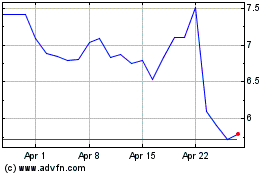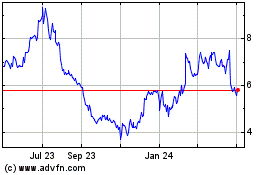Hurricane Matthew Heads for Bahamas, Florida
October 05 2016 - 9:30AM
Dow Jones News
Hurricane Matthew churned its way toward the Bahamas and Florida
Wednesday morning, as the U.S. Southeast braced for expected strong
winds and surge-related flooding.
The National Hurricane Center advised at 8 a.m. ET Wednesday
that the storm, currently with winds of up to 115 miles an hour,
would likely move north near the Florida coast Friday and Saturday,
veering slightly east off the Carolinas coast Sunday.
Current models have the storm then moving out into the Atlantic
Monday, and not making landfall on the continental U.S. Earlier
models predicted the storm would make landfall somewhere close to
the South Carolina/North Carolina border.
The center predicted heavy rain, strong winds and storm surges
along the southern U.S. East Coast. The storm weakened as it passed
over Haiti, but could strengthen as it moves over the Bahamas,
according to the National Hurricane Center.
The center advisory said it is too soon to predict what impact
the storm may have on the rest of the East Coast but "at a minimum,
dangerous beach and boating conditions are likely along much of the
U.S. East Coast later this week and weekend."
Southern states are taking no chances. Governors of Florida,
Georgia and the Carolinas declared states of emergency.
South Carolina Gov. Nikki Haley ordered evacuations Wednesday of
coastal communities. She closed government offices and canceled
schools across much of the state.
She urged people leaving the coast to drive at least 100 miles
inland.
Georgia Gov. Nathan Deal declared a state of emergency in
counties near or on the coast and ordered the Georgia Emergency
Management and Homeland Security Agency to work with local and
state officials "to ensure all precautions are taken to protect
residents and minimize risks to property and roads."
U.S. airlines widened their lists of airports they fear might be
affected by the storm, while working to restore normal service in
the storm's aftermath in the Caribbean.
American Airline Group, Inc., the nation's top airline by
traffic, added 15 cities in the Carolinas and Georgia where
ticketed travelers can push back their travel for a few days
without change fees or fare penalties. That is on top of eight
cities in Florida and eight in the Caribbean, according to the
carrier's travel advisory.
American as of late Tuesday already had canceled 48 flights for
Wednesday, including 19 out of its Miami hub and 13 out of the
Bahamas.
Low-fare Spirit Airlines Inc., which has a hub in Fort
Lauderdale, said it canceled four daily flights to Jamaica and
Haiti until Thursday and issued travel advisories for Fort
Lauderdale and Orlando for Thursday and Friday. A spokesman said if
the storm continues on its forecast path, "we anticipate multiple
cancellations in both Fort Lauderdale and Orlando."
JetBlue Airways Corp. added travel advisories for eight cities
from Florida to North Carolina, offering customers booked to fly
from now until Sunday the chance to change plans and move travel
back a week or so.
United Continental Holdings Inc., and Delta Air Lines Inc. also
expanded their fee-waiver cities to include airports in the
Carolinas and coastal Georgia.
FlightAware.com, a flight tracking service, early Wednesday was
showing 92 flights canceled in the U.S. alone, out of 320
world-wide. Hardest hit by the hurricane appeared to be American,
JetBlue, U.S. regional carrier Republic Airways, Delta and Cubana,
the Cuban flag carrier.
Write to Cameron McWhirter at cameron.mcwhirter@wsj.com and
Susan Carey at susan.carey@wsj.com
(END) Dow Jones Newswires
October 05, 2016 09:15 ET (13:15 GMT)
Copyright (c) 2016 Dow Jones & Company, Inc.
JetBlue Airways (NASDAQ:JBLU)
Historical Stock Chart
From Mar 2024 to Apr 2024

JetBlue Airways (NASDAQ:JBLU)
Historical Stock Chart
From Apr 2023 to Apr 2024
